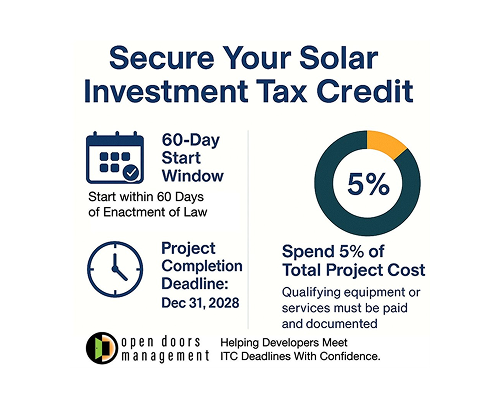Securing the Investment Tax Credit
What Solar Developers Need to Know Now
By Lane Sharman, Stuart Smits and Emil Botes for Open Doors Management

Maximize the ITC Before Time Runs Out
As the renewable energy landscape continues to evolve, the proposed tax legislation brings deadlines into focus for solar project developers. Under the new tax bill as proposed by the House and sent to the Senate, the Investment Tax Credit (ITC) remains a critical financial incentive—but only for those who understand and act on the new eligibility requirements.
Reach Out NowTwo Key Requirements Under the New Investment Tax Credit Framework
To qualify for the ITC under the new rules, solar projects must meet two conditions:
- 1 Construction must start within 60 days of the bill's enactment.
- 2 Projects must be completed by December 31, 2028.
Critical Timeline Alert
The window for action is narrow, and developers must move with precision and confidence.

Investment Tax Credit
Understanding "Start of Construction:" The 5% Rule
A central component of eligibility is proving that the project has officially “started.” The IRS recognizes two methods: the Physical Work Test and the 5% Safe Harbor. Most developers opt for the latter due to its clearer financial threshold. The Physical Work Test requires clear proof of actual site construction.
What is the 5% Safe Harbor?
To meet this standard, a project owner must incur at least 5% of the total project cost on eligible expenditures before the 60-day deadline. These costs must be integral to project completion — meaning they are necessary for the generation of electricity and not merely ancillary services or development fees.
Examples of Qualifying Expenditures
Project Development Services
Essential services that directly contribute to project completion and electricity generation.
Solar Equipment Purchase
Purchase of solar modules or inverters that are core to the system’s functionality.
Site-Specific Components
Site-specific engineering or racking components tailored to the project location.
Equipment Down Payments
Down payments on major equipment with binding contracts that guarantee delivery.
⚡ Critical Takeaway
The 5% must be both committed and paid. Simply signing a contract or issuing a purchase order is not enough. Payment must be completed, and documentation must be robust.
The Open Doors Advantage
Navigating the ITC eligibility landscape requires more than good timing – it requires strategic execution. At Open Doors Management, we specialize in guiding solar project developers through complex regulatory environments with a focus on compliance, speed, and certainty.

Contract Structuring
Structuring contracts and payment schedules to meet the 5% threshold requirements.

Cost Verification
Verifying qualifying costs and coordinating with vendors to ensure compliance.

Documentation Support
Documenting the Start of Construction for tax purposes with thorough record-keeping.

Financial Management
Managing cash flow from trust accounting to vendor disbursements seamlessly.
The Open Doors Advantage
With the potential for the countdown to begin in the latter half of 2025, timing is everything. Reach out today to learn how Open Doors Management can help you secure your project’s eligibility for the ITC—and ensure your Investment Tax Credit opportunity.

Lane Sharman, President
References
H.R. 1 – One Big Beautiful Bill Act. (2025, May 15). House of Representatives Committee on Rules. https://rules.house.gov/bill/119/hr-ORH-one-big-beautiful-bill-act
Beginning of Construction for Sections 45 and 48; Extension of Continuity Safe Harbor to Address Delays Related to COVID-19 and Clarification of the Continuity Requirement Notice 2021-41. Retrieved June 1, 2025, from: https://www.irs.gov/pub/irs-drop/n-21-41.pdf
Beginning of Construction for Purposes of the Renewable Electricity Production Tax Credit and Energy Investment Tax Credit. (2013). Retrieved June 1, 2025, from: https://www.irs.gov/pub/irs-drop/n-13-29.pdf
Safe Harbor Extended for Energy Credits for Qualified Projects | Tax Notes. (2020). Retrieved June 1, 2025, from: Tax Notes Research
A Closer Look at the House Ways and Means Budget Reconciliation Legislation–Process and Policies. (2025). Klgates.com. Retrieved June 1, 2025, from: K&L Gates Analysis
